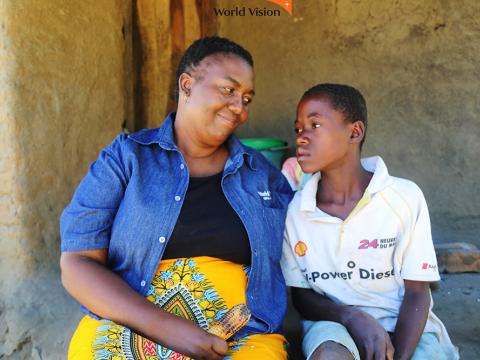The Cyclone that left children in fear and homeless

By Hazel Nyathi, National Director of World Vision Malawi
Pilirani sighs heavily as his parents talk to aid workers. The 12-year-old boy does not laugh when adults make jokes – a brief distraction from the reality of how much their lives have been devastated in the past few days.
Pilirani is among more than 400, 000 children who have been affected by recent floods in Malawi. Earlier in March, cyclone Idai – which would later be described as the “deadliest tropical cyclone worldwide in 2019” – made landfall in Mozambique. A few days later, it moved to neighbouring countries, causing severe flooding in Malawi and Mozambique.
Early warnings, including radio broadcasts, were not enough to protect communities. At least 56 people have died in Malawi, amid fears the death toll could increase in the following days. Overall, more than 822, 000 people have been affected in the country. Entire villages have been washed away. Infrastructures have collapsed, hindering relief efforts. Schools have been destroyed and people have resorted to taking shelter on rooftops and trees, waiting for the military to evacuate them.
In Matope village, Pilirani’s and another 4,000 houses have collapsed, affecting more than 12,000 people. This is not the first time Matope – and other areas of the country – have been hit by floods, but not to this extent. So people are now in a state of shock. Thousands have fled to safer areas and children are puzzled, they keep asking why they are not at home, and why they are unable to go to school.
A stone throw from Pilirani’s destroyed house is some bare ground. I am told a family used to live there, but all I can see is rubble, a reminder that there was once a home. Thankfully, they are safe, but everything they had is gone.
Being a mother myself, I try to think of what life is like for Pilirani’s mother and all the other parents who have sought refuge at a camp for displaced people. Most of them have small children, which is making everything more difficult.
Every day, lunchtime comes, supper time comes, but these parents have no food, nor clean water to give to their children. At night time, there are no beds where their children can have warm and peaceful dreams.
Circumstances can be unfair, and they can break us.
At this time of the year, farmers like Pilirani’s mother look forward to the year’s harvests. This season usually means that food is on the table every day and the “hunger period” is finally over. Unfortunately, the few crops they had have been swept away, meaning that they are facing hunger.
In the past few weeks, hundreds of people have died and more than 1.7million people have been affected across southern Africa. The cyclone, flooding and heavy rains have impacted so many lives that the emergency is quickly turning into a dire humanitarian crisis.
Help us give Pilirani and children like him food, clean water and a shelter and enough support to enable them to get back to their feet. If we stand alone, we won’t be able to cope with this crisis.